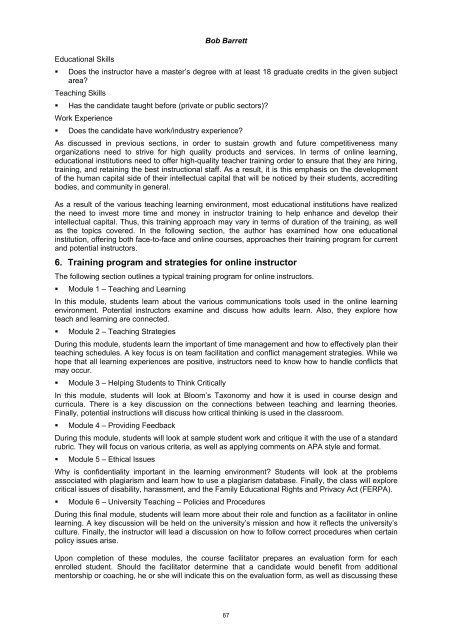Proceedings of the 3rd European Conference on Intellectual Capital
Proceedings of the 3rd European Conference on Intellectual Capital
Proceedings of the 3rd European Conference on Intellectual Capital
Create successful ePaper yourself
Turn your PDF publications into a flip-book with our unique Google optimized e-Paper software.
Bob Barrett<br />
Educati<strong>on</strong>al Skills<br />
Does <str<strong>on</strong>g>the</str<strong>on</strong>g> instructor have a master’s degree with at least 18 graduate credits in <str<strong>on</strong>g>the</str<strong>on</strong>g> given subject<br />
area?<br />
Teaching Skills<br />
Has <str<strong>on</strong>g>the</str<strong>on</strong>g> candidate taught before (private or public sectors)?<br />
Work Experience<br />
Does <str<strong>on</strong>g>the</str<strong>on</strong>g> candidate have work/industry experience?<br />
As discussed in previous secti<strong>on</strong>s, in order to sustain growth and future competitiveness many<br />
organizati<strong>on</strong>s need to strive for high quality products and services. In terms <str<strong>on</strong>g>of</str<strong>on</strong>g> <strong>on</strong>line learning,<br />
educati<strong>on</strong>al instituti<strong>on</strong>s need to <str<strong>on</strong>g>of</str<strong>on</strong>g>fer high-quality teacher training order to ensure that <str<strong>on</strong>g>the</str<strong>on</strong>g>y are hiring,<br />
training, and retaining <str<strong>on</strong>g>the</str<strong>on</strong>g> best instructi<strong>on</strong>al staff. As a result, it is this emphasis <strong>on</strong> <str<strong>on</strong>g>the</str<strong>on</strong>g> development<br />
<str<strong>on</strong>g>of</str<strong>on</strong>g> <str<strong>on</strong>g>the</str<strong>on</strong>g> human capital side <str<strong>on</strong>g>of</str<strong>on</strong>g> <str<strong>on</strong>g>the</str<strong>on</strong>g>ir intellectual capital that will be noticed by <str<strong>on</strong>g>the</str<strong>on</strong>g>ir students, accrediting<br />
bodies, and community in general.<br />
As a result <str<strong>on</strong>g>of</str<strong>on</strong>g> <str<strong>on</strong>g>the</str<strong>on</strong>g> various teaching learning envir<strong>on</strong>ment, most educati<strong>on</strong>al instituti<strong>on</strong>s have realized<br />
<str<strong>on</strong>g>the</str<strong>on</strong>g> need to invest more time and m<strong>on</strong>ey in instructor training to help enhance and develop <str<strong>on</strong>g>the</str<strong>on</strong>g>ir<br />
intellectual capital. Thus, this training approach may vary in terms <str<strong>on</strong>g>of</str<strong>on</strong>g> durati<strong>on</strong> <str<strong>on</strong>g>of</str<strong>on</strong>g> <str<strong>on</strong>g>the</str<strong>on</strong>g> training, as well<br />
as <str<strong>on</strong>g>the</str<strong>on</strong>g> topics covered. In <str<strong>on</strong>g>the</str<strong>on</strong>g> following secti<strong>on</strong>, <str<strong>on</strong>g>the</str<strong>on</strong>g> author has examined how <strong>on</strong>e educati<strong>on</strong>al<br />
instituti<strong>on</strong>, <str<strong>on</strong>g>of</str<strong>on</strong>g>fering both face-to-face and <strong>on</strong>line courses, approaches <str<strong>on</strong>g>the</str<strong>on</strong>g>ir training program for current<br />
and potential instructors.<br />
6. Training program and strategies for <strong>on</strong>line instructor<br />
The following secti<strong>on</strong> outlines a typical training program for <strong>on</strong>line instructors.<br />
Module 1 – Teaching and Learning<br />
In this module, students learn about <str<strong>on</strong>g>the</str<strong>on</strong>g> various communicati<strong>on</strong>s tools used in <str<strong>on</strong>g>the</str<strong>on</strong>g> <strong>on</strong>line learning<br />
envir<strong>on</strong>ment. Potential instructors examine and discuss how adults learn. Also, <str<strong>on</strong>g>the</str<strong>on</strong>g>y explore how<br />
teach and learning are c<strong>on</strong>nected.<br />
Module 2 – Teaching Strategies<br />
During this module, students learn <str<strong>on</strong>g>the</str<strong>on</strong>g> important <str<strong>on</strong>g>of</str<strong>on</strong>g> time management and how to effectively plan <str<strong>on</strong>g>the</str<strong>on</strong>g>ir<br />
teaching schedules. A key focus is <strong>on</strong> team facilitati<strong>on</strong> and c<strong>on</strong>flict management strategies. While we<br />
hope that all learning experiences are positive, instructors need to know how to handle c<strong>on</strong>flicts that<br />
may occur.<br />
Module 3 – Helping Students to Think Critically<br />
In this module, students will look at Bloom’s Tax<strong>on</strong>omy and how it is used in course design and<br />
curricula. There is a key discussi<strong>on</strong> <strong>on</strong> <str<strong>on</strong>g>the</str<strong>on</strong>g> c<strong>on</strong>necti<strong>on</strong>s between teaching and learning <str<strong>on</strong>g>the</str<strong>on</strong>g>ories.<br />
Finally, potential instructi<strong>on</strong>s will discuss how critical thinking is used in <str<strong>on</strong>g>the</str<strong>on</strong>g> classroom.<br />
Module 4 – Providing Feedback<br />
During this module, students will look at sample student work and critique it with <str<strong>on</strong>g>the</str<strong>on</strong>g> use <str<strong>on</strong>g>of</str<strong>on</strong>g> a standard<br />
rubric. They will focus <strong>on</strong> various criteria, as well as applying comments <strong>on</strong> APA style and format.<br />
Module 5 – Ethical Issues<br />
Why is c<strong>on</strong>fidentiality important in <str<strong>on</strong>g>the</str<strong>on</strong>g> learning envir<strong>on</strong>ment? Students will look at <str<strong>on</strong>g>the</str<strong>on</strong>g> problems<br />
associated with plagiarism and learn how to use a plagiarism database. Finally, <str<strong>on</strong>g>the</str<strong>on</strong>g> class will explore<br />
critical issues <str<strong>on</strong>g>of</str<strong>on</strong>g> disability, harassment, and <str<strong>on</strong>g>the</str<strong>on</strong>g> Family Educati<strong>on</strong>al Rights and Privacy Act (FERPA).<br />
Module 6 – University Teaching – Policies and Procedures<br />
During this final module, students will learn more about <str<strong>on</strong>g>the</str<strong>on</strong>g>ir role and functi<strong>on</strong> as a facilitator in <strong>on</strong>line<br />
learning. A key discussi<strong>on</strong> will be held <strong>on</strong> <str<strong>on</strong>g>the</str<strong>on</strong>g> university’s missi<strong>on</strong> and how it reflects <str<strong>on</strong>g>the</str<strong>on</strong>g> university’s<br />
culture. Finally, <str<strong>on</strong>g>the</str<strong>on</strong>g> instructor will lead a discussi<strong>on</strong> <strong>on</strong> how to follow correct procedures when certain<br />
policy issues arise.<br />
Up<strong>on</strong> completi<strong>on</strong> <str<strong>on</strong>g>of</str<strong>on</strong>g> <str<strong>on</strong>g>the</str<strong>on</strong>g>se modules, <str<strong>on</strong>g>the</str<strong>on</strong>g> course facilitator prepares an evaluati<strong>on</strong> form for each<br />
enrolled student. Should <str<strong>on</strong>g>the</str<strong>on</strong>g> facilitator determine that a candidate would benefit from additi<strong>on</strong>al<br />
mentorship or coaching, he or she will indicate this <strong>on</strong> <str<strong>on</strong>g>the</str<strong>on</strong>g> evaluati<strong>on</strong> form, as well as discussing <str<strong>on</strong>g>the</str<strong>on</strong>g>se<br />
67
















